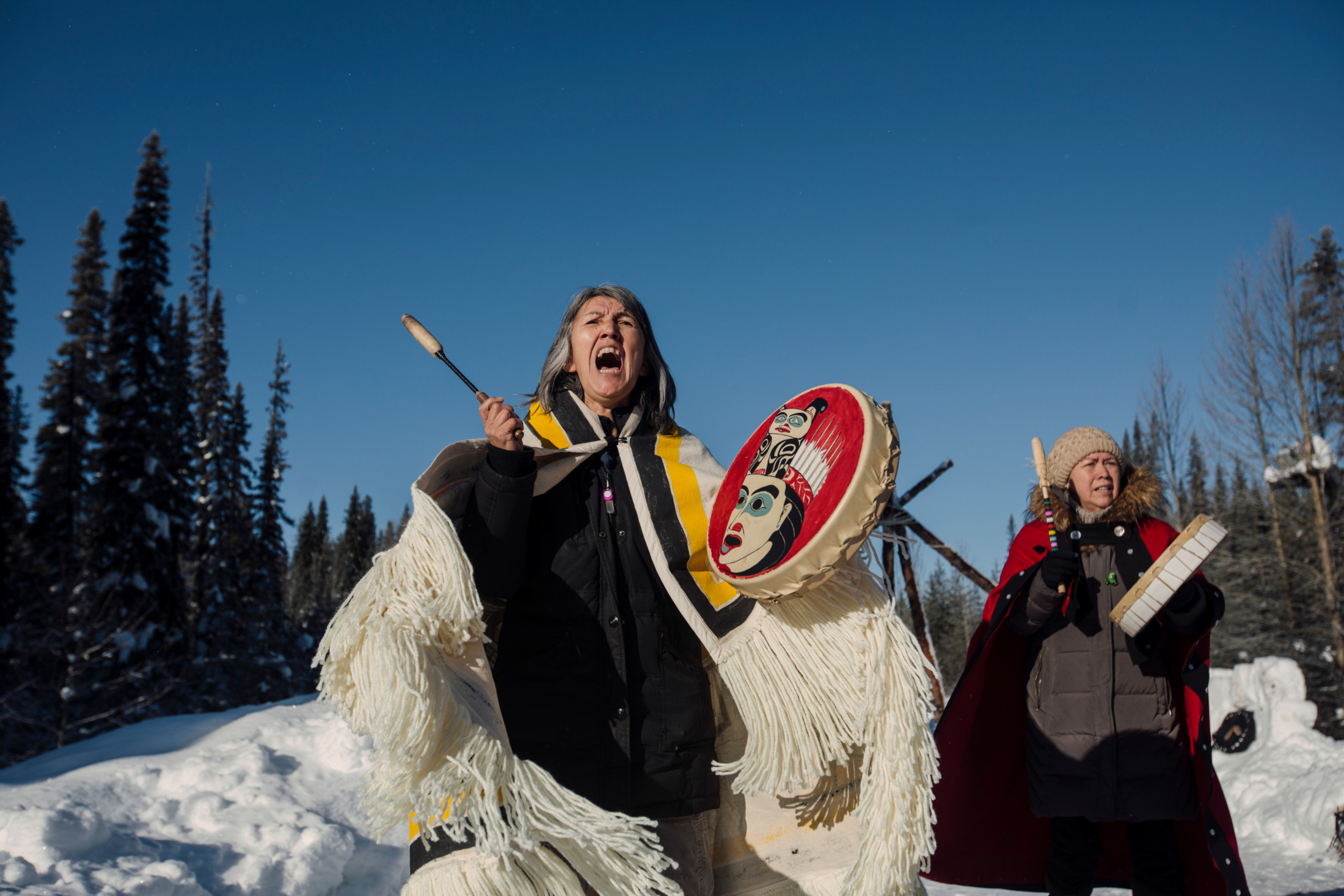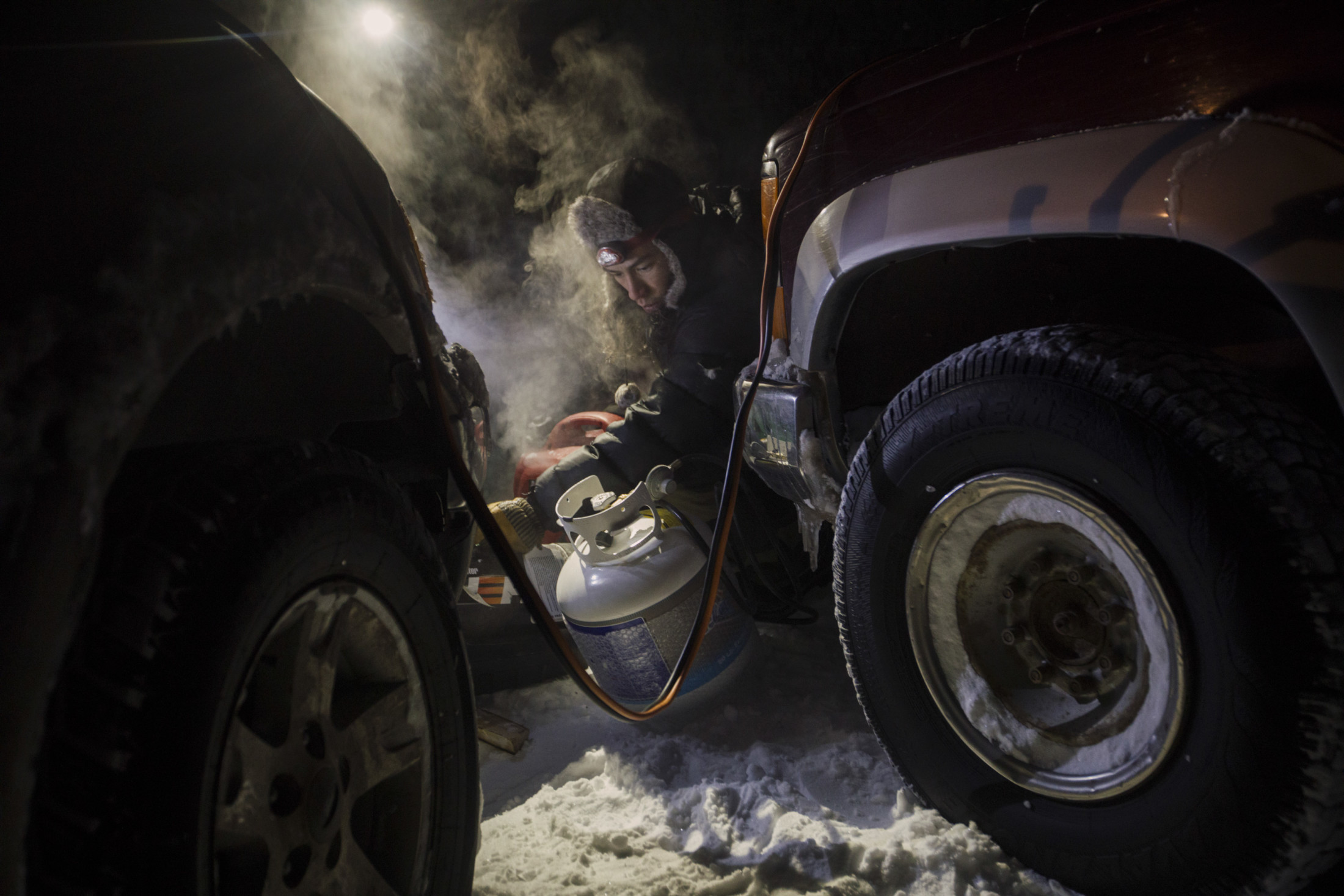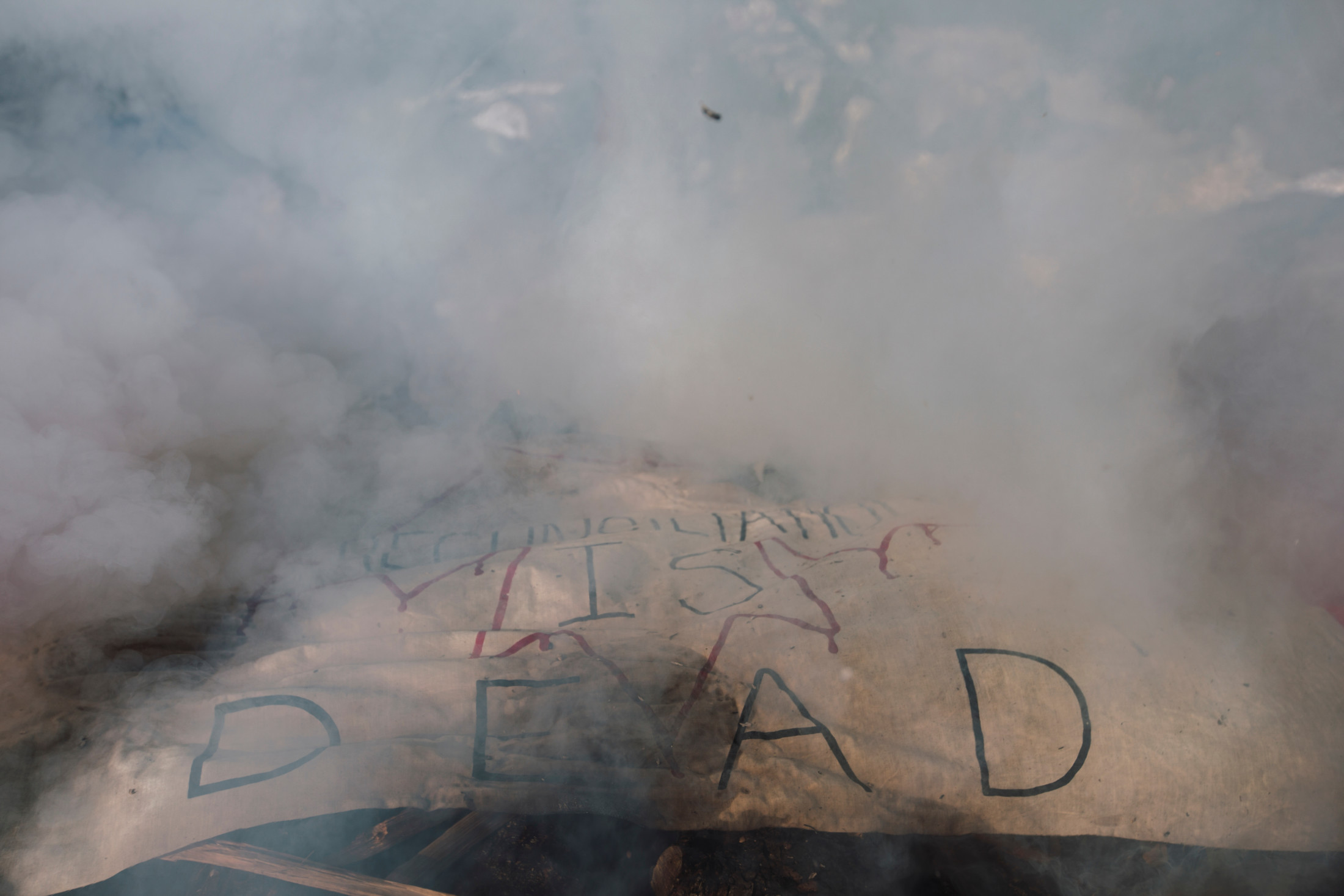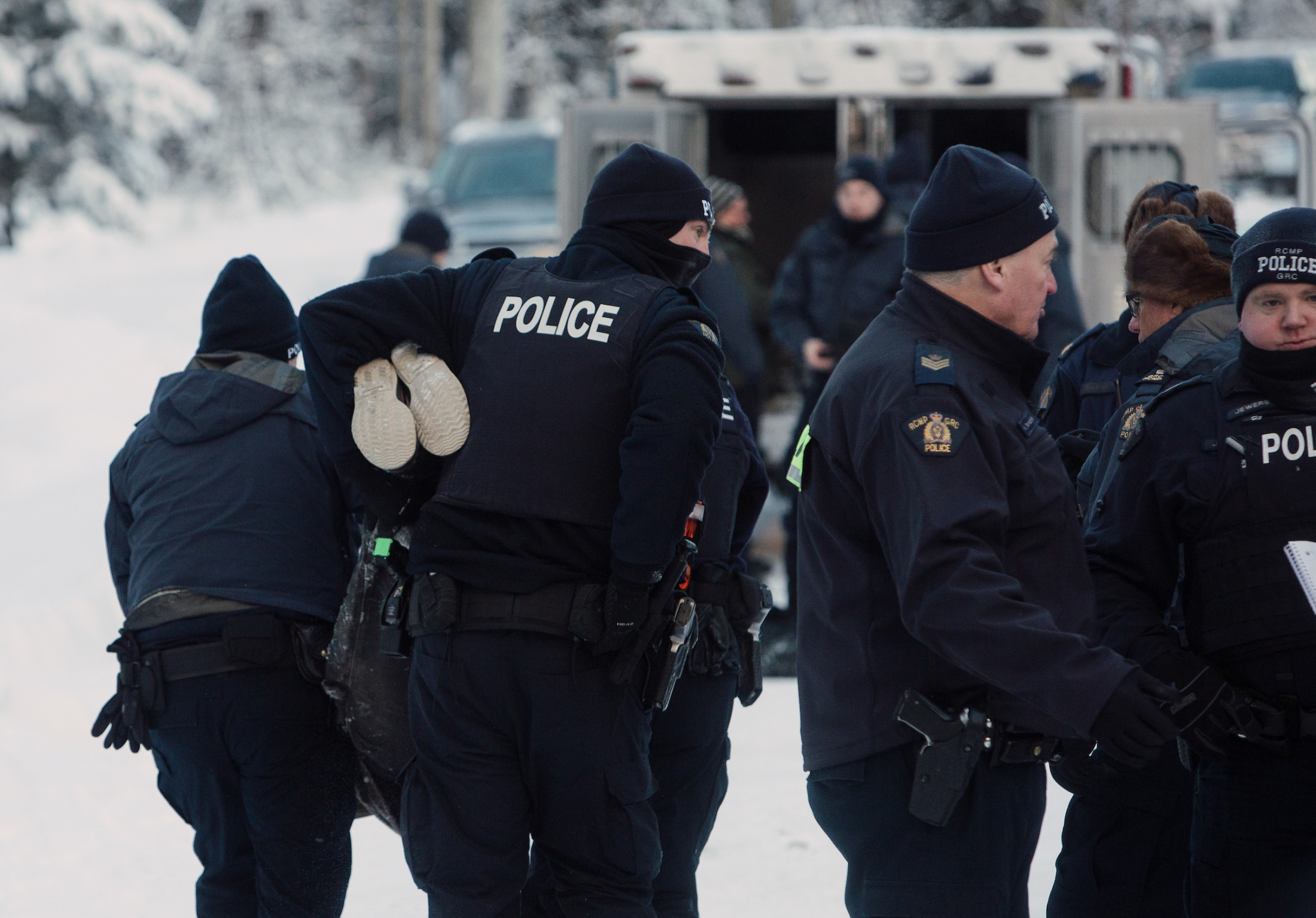Documents obtained by The Narwhal reveal representatives of resource industries and government sought the ‘surrender’ of Indigenous land rights in the wake of the precedent-setting Delgamuukw decision, which affirmed Aboriginal title on unceded territory
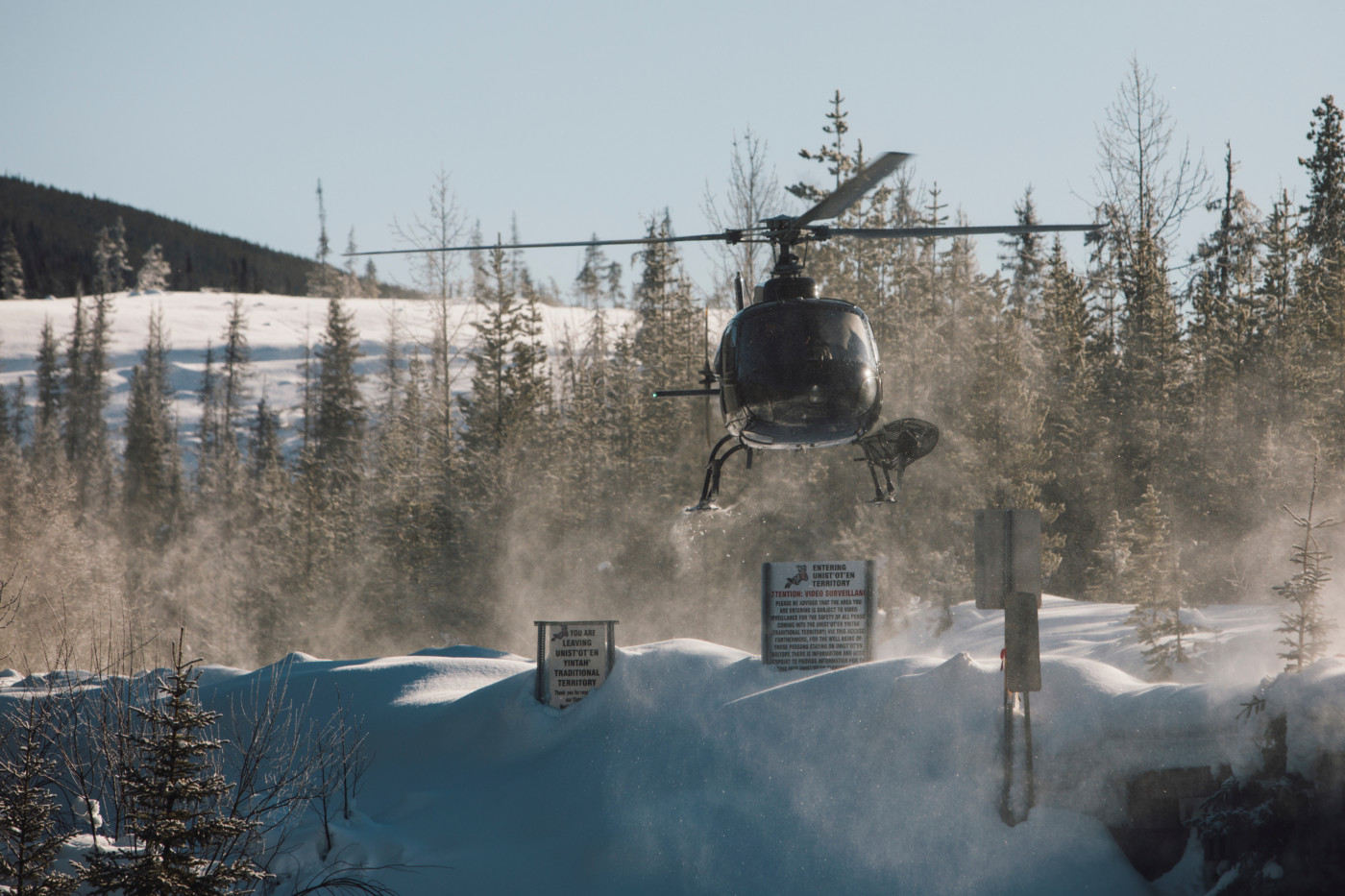
An RMCP helicopter takes off after Unist’ot’en spokesperson and founder, Freda Huson, refused to negotiate surrender with the police on Feb. 8. Photo: Amber Bracken / The Narwhal
he B.C. government and corporate lobbyists representing major resource industries sought the “surrender” of First Nations land rights immediately following the Delgamuukw decision, a precedent-setting legal ruling that established Aboriginal title to unceded land, according to Freedom of Information (FOI) documents obtained by The Narwhal.
The records, from B.C.’s Ministry of Aboriginal Affairs, provide a glimpse for the first time of a corporate lobbying effort urging government to push First Nations to surrender their newly recognized title rights through modern treaties to achieve “certainty” for commercial interests.
Internal emails, memos and confidential briefing notes also show that, immediately after the Delgamuukw decision came down from the Supreme Court of Canada on Dec. 11, 1997, B.C. government officials discussed tactics to fight land rights with legal challenges, to curb direct action or litigation by First Nations and to use federal money intended for the healing of residential school survivors to make treaty negotiations more attractive.
The push for “certainty” for industry operating in B.C. remains a strong focus for government to this day.
The Delgamuukw decision — prompted by a case launched in the 1980s by Wet’suwet’en hereditary chiefs and the neighbouring Gitxsan Nation — cuts to the heart of the Wet’suwet’en nation’s on-going opposition to Coastal GasLink’s plan to build a 670-kilometre fracked gas pipeline through the nation’s traditional territory to LNG export facilities in Kitimat.
In the decision, Supreme Court justices declared that nations like the Wet’suwet’en, who had never signed treaties, still hold unceded rights to their lands.
A supporter at Unist’ot’en camp in Wet’suwet’en territory Jan. 15. Arrests of supporters at the camp are expected to take place Sunday, Feb. 9. Photo: Amber Bracken / The Narwhal
The threat of Aboriginal title
In early January Wet’suwet’en hereditary chiefs issued an eviction notice to Coastal GasLink after the B.C. Supreme court extended an injunction against members of the Wet’suwet’en and their supporters who are preventing the company from accessing contested work sites along the pipeline corridor near Houston, B.C. A year earlier, in January 2019, the RCMP enforced the injunction and arrested 14 people in a controversial move that drew international attention
Days after the eviction notice was served, Wet’suwet’en hereditary chiefs met with the B.C. RCMP’s commanding officer, deputy commissioner Jennifer Strachan.
Hoping to avert a repeat of last year’s much-criticized police action, Chief Hagwilnegh (Ron Mitchell) of the Wet’suwet’en’s Small Frog clan offered the deputy commissioner a piece of advice: consult the Delgamuukw decision.
“Read that, before you give out your orders,” he recalled telling her.
Although the Delgamuukw ruling happened almost 25 years ago it is still considered one of the most important rulings on Indigenous land rights in Canadian history.
For 150 years prior to the ruling, all levels of government insisted Aboriginal title had been extinguished and thus had no impact on decision-making.
“If the government had taken the approach of co-existence advocated by the court, we wouldn’t be dealing with what we’re dealing with today.”
The Delgamuukw ruling found Aboriginal title is a unique, collectively held interest in the land that could grant Indigenous peoples exclusive occupation and require consent prior to resource development or other activities that could affect their territory.
The ruling sent shockwaves through the country, promising a transformation in Indigenous peoples’ rights to govern their ancestral territories.
Hagwilnegh, who worked as a translator for Elders testifying in court in their Wet’suwet’en language, remembered being hopeful that Aboriginal title would be reconciled with Crown title, as the federal Supreme Court judges had directed.
“If the government had taken the approach of co-existence advocated by the court, we wouldn’t be dealing with what we’re dealing with today,” he told The Narwhal.
But the government and resource companies had other ideas.
Freda Huson, centre, and her sister, Brenda Michell, stand in ceremony while they wait for police to enforce Coastal GasLink’s injunction. Photo: Amber Bracken / The Narwhal
‘The decision makes the need for certainty through surrender all the more clear’
In a committee formed by the B.C. NDP government of Glen Clark — to allow oil and gas, forestry, cattle, real estate and mining associations to offer advice about treaty negotiations — various lobbyists pushed the government to limit the consequences of the Supreme Court decision, according to the FOI documents.
According to one memo, detailing a meeting that took place one day after the Delgamuukw ruling, Marlie Beets, then vice-president of the BC Council of Forest Industries, remarked that she had spent the previous hour “trying to calm” the CEOs she represented.
“[Delgamuukw] has only created more uncertainty and we are very concerned by how governments will react to the court’s findings,” Beets said. “The decision makes the need for certainty through surrender all the more clear. We see no other alternative.”
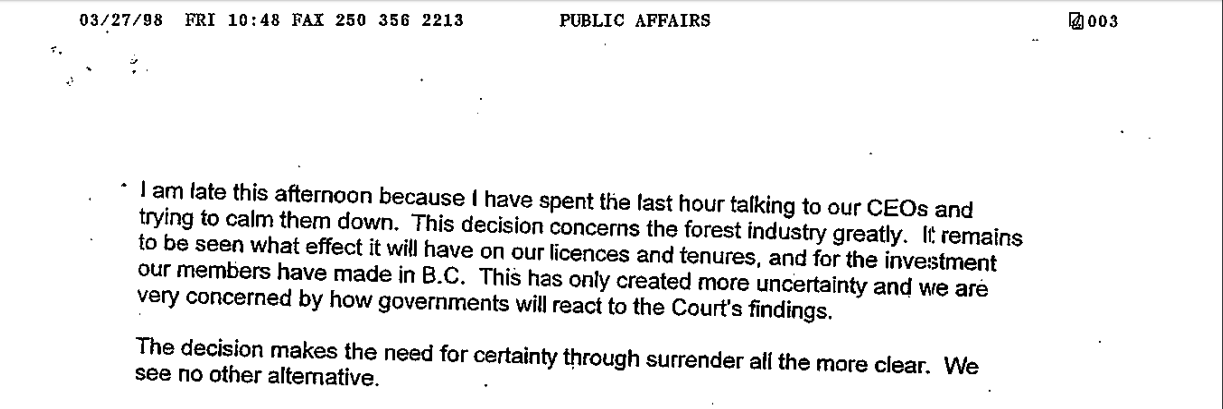
A document released through Freedom of Information rules quotes Marlie Beets relaying the anxiety of CEOs with the BC Council of Forest Industries in response to the Delgamuukw decision. Beets notes the ruling makes the need for economic “certainty through surrender” of Aboriginal title “clear.”
Mike Hunter, then the president of the Fisheries Council of B.C., urged the government to “downplay the expectations that Aboriginal leaders have.”
Mary MacGregor, then director of the B.C. Cattlemen’s Association, promised that “we will be putting great pressure on the provincial government to commit to a cede, release and surrender approach.”
Several days later, a new Delgamuukw strategy team formed by the ministry noted in a memo that “the oil and gas industry in particular has expressed concern about their ability to continue to do business in the province absent a clear direction from the government on how it will address the implications of the Delgamuukw decision.”
The following spring, John Watson, then-regional B.C. director of the federal Ministry of Indian Affairs wrote in a letter that both provincial and federal governments “are under tremendous pressure to ensure that we achieve the level of certainty required to assure business and other third parties.”
Indigenous-led opposition to unwanted natural resource projects and infrastructure has been bolstered by decisions such as Delgamuukw, Haida Nation and Taku River Tlingit.
In B.C., as in Quebec, Yukon, the Northwest Territories and the Atlantic provinces, the vast proportion of land has never been subject to treaty. Although often referred to as public or Crown land, most of these areas are the unceded homelands of Indigenous nations.
These communities are increasingly laying legal claim to their territory through the courts. A 2014 decision, for instance, granted the Tsilhqot’in nation Aboriginal title to 438,000 hectares of its traditional territory. It took the Tsilhqot’in 25 years to win its legal challenge in the Supreme Court of Canada. The B.C. and federal government fought the title claim from start to finish.
Following the Delgamuukw decision, the federal Supreme Court indicated the Wet’suwet’en could make a similar legal claim to its 22,000 square kilometre territory. Notably, the judges urged the government to seek to reconcile Aboriginal title with Crown title through negotiations, in the spirit of what it called “the honour and good faith of the Crown.”
But the FOI documents show the priority for both B.C. and federal governments was to try to resolve the economic and legal uncertainty for resource industries seeking access to land and natural resources.
In a “certainty working group” meeting arranged by the B.C. Treaty Negotiations advisory committee, lawyer Chris Harvey warned that, post-Delgamuukw, “there is now uncertainty over whether the entire province is burdened by Aboriginal title.”
What should be sought through the treaty process, Harvey said, is “an end of Aboriginal rights and title.”
B.C. government officials, for their part, promised to accomplish this through the existing B.C. modern treaty process.

An excerpt of a fax sent on March 27, 1998, quoting lawyer Chris Harvey stating treaty rights are needed to bring about the ‘end of Aboriginal rights and title.’
‘Treaties offer the only long-term solution’
The treaty process, created in 1992, offered a way for the provincial government to forge agreements with First Nations that had never signed historic treaties.
The process drove a hard bargain for First Nations: they could relinquish rights to close to 95 per cent of their traditional territories — giving resource companies “certainty,” or uncontested access — in exchange for financial compensation and small parcels of land.
Nations like the Wet’suwet’en, which refused to enter the B.C. treaty process, were stone-walled, Hagwilnegh told The Narwhal.
“If we sat down to talk, it didn’t go anywhere. Meanwhile, government continued to hand out licences for all sorts of things — mining, clear-cut logging and, as we see today, pipelines.”
A Gitxan supporter works to start a truck at a Wet’suwet’en re-occupation camp on Jan. 13. Photo: Amber Bracken / The Narwhal
Following Delgamuukw’s recognition of Aboriginal title, many Indigenous advocates and lawyers argued Canada should stop requiring First Nations to extinguish their rights and instead seek out shared jurisdiction that would allow Indigenous nations to develop sustainable economies.
Indeed, the FOI documents show that in the wake of the ruling, officials at the B.C. Ministry of Aboriginal Affairs expressed fear that the “credibility of the treaty process is in question.”
But rather than shift its approach, the ministry deliberated how to accelerate negotiations and “[revamp] the treaty process to create faster certainty in the areas of lands and resources.”
The FOI documents include draft speaking notes prepared for then-B.C. Minister of Aboriginal Affairs John Cashore in advance of a public forum with First Nations in late 1998.
The notes show Cashore’s prepared lines, which state, “there is no doubt that Delgamuukw also signals a need for a change in the way we do business.”
“The decision confirmed we are on the right track by negotiating instead of litigating,” the bullet-point speaking notes state. “We still believe that treaties offer the only long-term solution to gaining certainty around Aboriginal title and Aboriginal rights.”
But in private, government bureaucrats discussed several hardball tactics, including litigation, the FOI documents reveal.
The bureaucrats proposed the idea of signing “interim agreements” with First Nations that would have them “agree to support economic stability in British Columbia by refraining from direct action or litigation,” without which negotiations would not proceed.
“Make sure we take advantage of potential litigation and maybe even initiate where we feel it could help us,” Doug Caul, then-director of Aboriginal affairs at the B.C. Ministry of Forests, suggested as a possible tactic in an email exchange with colleagues from different provincial ministries.
Caul also noted the province could strike back with a court challenge: “This will be controversial, but it seems likely that Delgamuukw will spawn more litigation,” he said. “Future litigation could help [d]efine the scope of title.”
“I am not suggesting we pick a fight,” Caul wrote on Dec. 17, 1997, less than one week after the Delgamuukw decision, “but that we make sure we take advantage of potential litigation and may be (sic) even initiate where we feel it it (sic) could help us, instead of waiting and reacting.”

An excerpt from an email written by Doug Caul less than one week after the Delgamuukw decision, suggesting government “take advantage of potential litigation” to limit the scope of the ruling’s significance for title rights.
Today, Caul is the deputy minister of B.C.’s Ministry of Indigenous Relations and Reconciliation, responsible for overseeing Bill 41, B.C.’s new legislation contending with the United Nations Declaration on the Rights of Indigenous Peoples.
Escalating government tactics to ‘sweeten the deal’
In a memo to the B.C. Ministry of Aboriginal Affairs, provincial treaty negotiators suggested using federal funds intended for the healing of residential school survivors to advance treaty negotiations.
As part of the federal response to the Royal Commission on Aboriginal Peoples, the Liberal government of Jean Chretien had established the Aboriginal Healing Foundation with a $350 million dollar grant in 1998.
In order to “sweeten the deal” offered by the B.C. treaty process, B.C. negotiators suggested asking the federal government to prioritize healing money for First Nations who engaged in treaty negotiations.

Internal documents from B.C. treaty negotiators recommending healing funds for residential school survivors be used to “sweeten the deal” of modern treaties.
“Were the federal government to be strategic in how this money were spent in British Columbia, then they would prioritize those First Nations with which they are having treaty negotiations as the major beneficiaries of this program,” the treaty negotiators wrote. “In addition, the money could be made available as a ‘down payment’ on an eventual treaty and given credit accordingly.”
It is unclear whether the federal government ever acted or received a request to act on this idea.
The documents also show the provincial government monitored the activities of First Nations in B.C.’s interior who were critical of the treaty process. When the Union of B.C. Indian Chiefs marched in downtown Vancouver on the first year anniversary of Delgamuukw, officials prepared media lines to highlight how they had “moved forward on a number of fronts.”
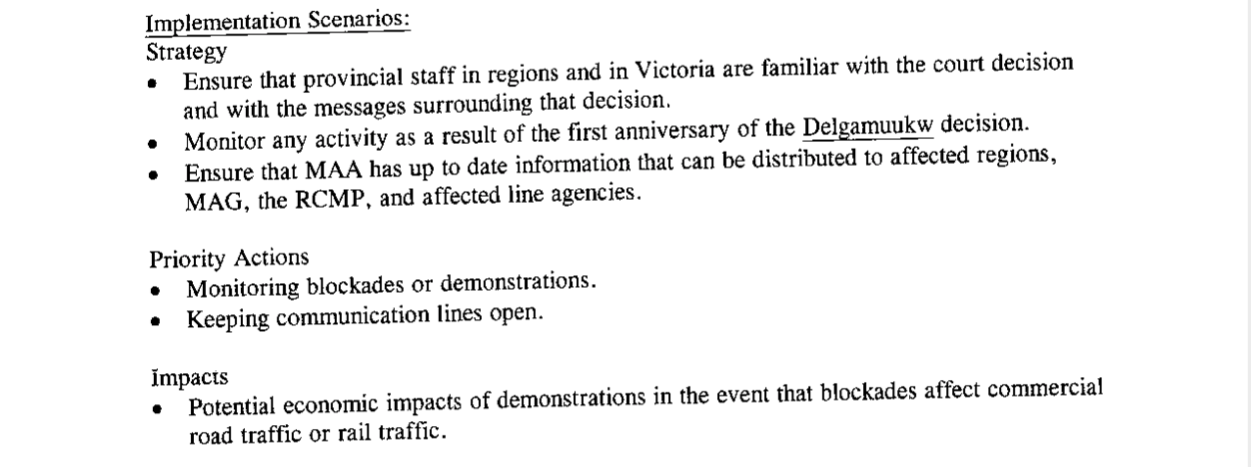
Documents reveal that upon the one-year anniversary of the Delgamuukw decision, government officials considered “monitoring blockades” a priority action. The documents also note a strategic priority to ensure the Ministry of Aboriginal Affairs update the Ministry of the Attorney General and the RCMP on “affected regions.”
The ‘surrender approach’ continues
UBC Indigenous legal scholar Gordon Christie called the FOI documents “illuminating.”
“It confirms what has been common knowledge in Indigenous circles — that the approach that emerged out of these discussions has been pursued by both provincial and federal governments for decades,” Christie said.
Mohawk policy analyst Russell Diabo, who was working with interior B.C. First Nations when the Delgamuukw decision came down, said the “continuities are clear” over the decades.
“The governments have shown their main aim remains keeping powerful business interests happy and containing the power of Aboriginal rights and title, rather than moving toward a respectful relationship.”
United Nations bodies have repeatedly criticized the Canadian government for trying to dress up old policies that have been rejected by First Nations.
The UN Committee on Economic, Social and Cultural Rights noted in 2006 it “remains concerned that the new approaches, namely the ‘modified rights model’ and the ‘non-assertion model,’ do not differ much from the extinguishment and surrender approach.”
Despite the enormous effort by the B.C. government, treaty negotiations have resulted in only eight modern treaties that “modify” or “surrender” their Aboriginal title.
The Trudeau and Horgan governments have introduced an array of new policy mechanisms and “reconciliation” agreements, but Hagwilnegh said they promote essentially the same end result and remain unacceptable to the Wet’suwet’en.
“The government never likes it when we bring up Delgamuukw,” he said. “They clam up. And on those occasions when we have been able to educate government officials, the next day, poof, we get new officials sent to us.”
When contacted by The Narwhal, instead of answering questions the Ministry of Indigenous Relations and Reconciliation referred to a press release stating it is “basing negotiations on the recognition and continuation of rights without those rights being modified, surrendered or extinguished when a treaty is signed.”
An imitation flag that reads “reconciliation is dead” burns on a funeral pyre as a small envoy of police arrive at Unist’ot’en Healing Centre on Saturday, Feb 8. Photo: Amber Bracken / The Narwhal
“The new policy will enable flexible, innovative and collaborative approaches that improve how treaties are reached in B.C.,” the release said.
Diabo said the modern approach bears an uncomfortable resemblance to older methods. “Though the B.C. and federal government never tires of varnishing their approach to convince us that it’s brand sparkling new, their end-game remains to extract surrender of Aboriginal title to Crown sovereignty,” he told The Narwhal.
In the years since Delgamuukw, some First Nations have chosen further litigation or direct action to uphold the rights recognized in the ruling.
Diabo noted the response from the government has often been criminalization, pointing to the arrest of Wet’suwet’en land defenders in January 2019 as the latest in a line of policing actions taken against Indigenous peoples across Canada.
“The police lay down the law — or what they think the law is,” said Hagwilnegh, who has educated Wet’suwet’en youth about the meaning of the Delgamuukw court decision and worked with community members to map creeks, forests and hills across the nation’s traditional territory.
“But Delgamuukw was brought down by the Supreme Court, the highest court of Canada.”
Police make an arrest January 2019 while enforcing the injunction filed by Coastal GasLink at the Gidimt’en checkpoint. Photo: Amber Bracken
Over the past several weeks, Hagwilnegh, acting as the police liaison for the hereditary chiefs, said he has continued to speak on the phone with RCMP deputy commissioner Strachan, whom the B.C. RCMP declined to make available for comment.
Hagwilnegh said Strachan took his advice and read up on Delgamuukw and he thinks she has listened more than the former commissioner, who oversaw the raid on Wet’suwet’en territory last year.
“But after our Elders told the world who we are and how we look after the land, as caretakers of the territory, is that the best the government can do?” Hagwilnegh asked. “It is long past time they respect their own laws.” SOURCE






